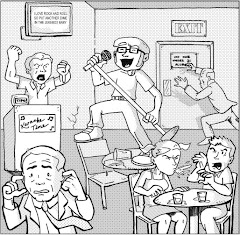The Boys #1, October 2006, Wildstorm Productions
writer: Garth Ennis
artist: Derick Robertson
colorist: Tony Avina
letterer: Greg Thompson
assistant editor: Kristy Quinn
editor: Ben Abernathy
That quarterly report will be on your desk first thing in the morning, Sir. I swear.
In the meantime, let's take a look at The Boys #1, another instant Garth Ennis classic, complete with its overt sex, violence, and middle-aged angst against the machine. In this case, "the machine" is the mainstream superhero genre. The Boys is about an under-the-table government-sanctioned group of superhero police. Apparently, they keep superheroes accountable for their recklessly violent actions, in turn by being recklessly violent, I presume. The first page of this series depicts the lead -- Butcher -- stomping on a wanna-be Captain America's face, an image that plays no other role in the issue but the offering of that shocking first impression, that "wow, this is gonna be a hard-hitting comic" sensation.
Still, I suspect that Ennis has an ulterior motive. See, there's a small but extremely popular faction of comic book writers that have expressed a blatant disgust for the superhero faction of their industry. Ennis and Warren Ellis are often the leaders of this pack. Hey, I don't blame them. If I worked at McDonald's and everybody only ordered a six-piece, I'd get bored and annoyed pretty quickly, too. When interviewed or journaling on the subject, these writers have always insisted that superhero fiction dominates their medium, and further, that the cookie-cut black and white morality of it all, coupled with the spandex-clad homoeroticism of these mindless slugfest-driven franchised epics, have dullened the impact comics can have as a forum for graphic sequential storytelling. (That's my synopsis, by the way.) Although I'm a fan of superheroes, fairly because they remind me of my carefree youth, I'd agree with them . . .
. . . if they didn't keep writing superhero comics. Preacher may have been an epic social commentary with spiritual, social, and political overtones, with smatterings of romance and western comics influence for good measure, but Jesse Custer was still brandishing a super power. He was a super hero. If Preacher was published sans controversial language and adult material, if the violence was just a little less so, and if the Vertigo label was replaced with the DC bullet, the series would have been a short-lived superhero title, plain and simple. Ellis's Transmetropolitan is arguably in the same genre of anti-capes comics, in the post-modern sense of the phrase. Spider Jerusalem didn't have any powers, but he had a well honed talent that he used to change the world for the better, as he perceived the concept. Basically, he was Frank Miller's Batman minus the training and long underwear, even so far as "adopting" a few female sidekicks along the way to proverbially dethroning the President (if only in a symbolic way, in Reagan's and Luthor's cases from Dark Knight Returns and Strikes Again).
And these are just their "magnum opus" titles, the series that they are best known for. Ellis and Ennis have both written bona fide superhero comics, on many occasions. Superheroes may be killing the comic book as an artform, but it's certainly good enough to put food on the table.
Don't get me wrong. I count Preacher and Transmet as two of my favorite finite books, and Ellis and Ennis are among my favorite writers, even if their respective styles have begun to parody themselves. Consider the other Ennis #1 I recently reviewed: A Man Called Kev #1. First issue, gratuitous sex and violence, but a few characters I'd like to get to know better. Same formula. And in the Boys' case, they've found an artist, Transmet's Robertson, that can depict the duality their dark but fantastic world expertly. He's been on both sides of the fence, too. He's mastered both.
Am I in for The Boys #2? Absolutely. But I hope Ennis' vague allegory begins to unravel into a genuinely complex piece of fiction, as I'd expect from him. What allegory, you ask? Well, whose boot was really stomping that cornfed captain on page one? Who's really trying to take superheroes to task here? Ellis pulled a similar stunt in Planetary, when Jerusalem appeared as the "new face of comics." Ennis is trying change the genre from the inside out. Let's see if he can save the day.
Monday, October 02, 2006
Subscribe to:
Post Comments (Atom)



No comments:
Post a Comment